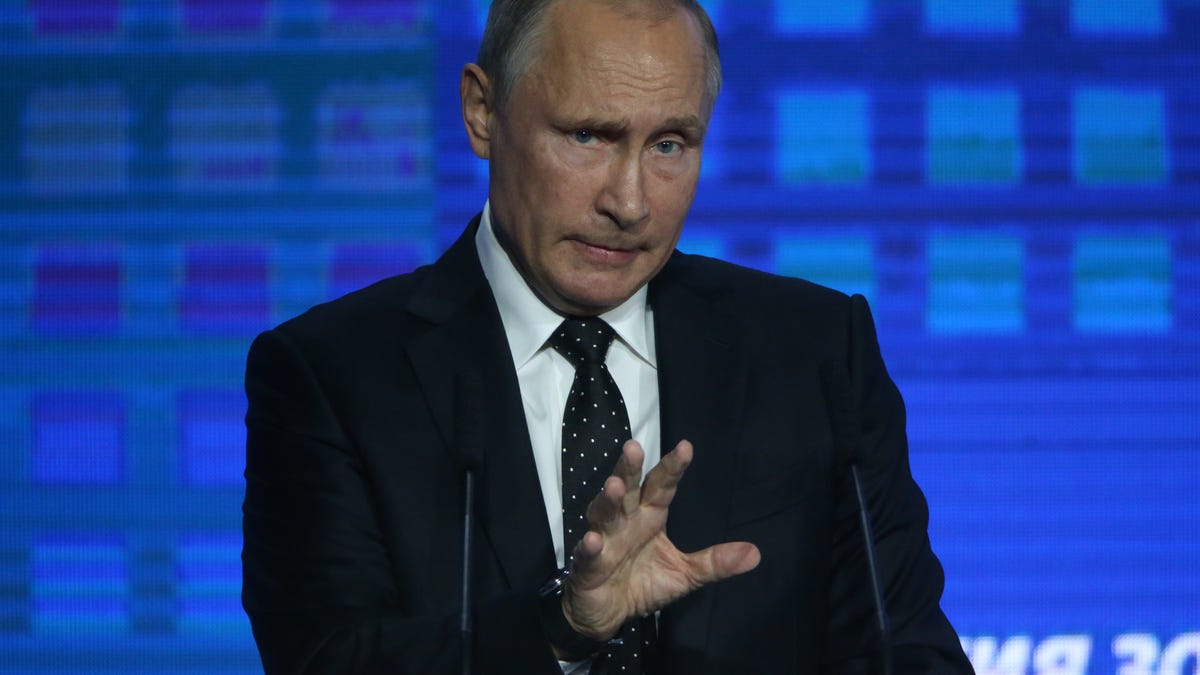Obama may respond to Russian hacks. But how?
The US has lots of options for striking back against the country it claims tried to interfere with the election. Among them are some serious hacking tools.

Russian President Vladimir Putin speaks at an event in Mosow in October.
US intelligence agencies have officially blamed Russia for recent hacks on Democratic political organizations.
Great. Now what?
Apparently, there's a response in the works, but we may never know exactly what form it takes.
On Tuesday, White House press secretary Josh Earnest told reporters that President Barack Obama plans to strike back against Russia for the hacks, which the Department of Homeland Security and the Office of the National Director of Intelligence said were meant to interfere with the US presidential election.
"The president has talked before about the significant capabilities that the US government has to both defend our systems in the United States, but also carry out offensive operations in other countries," Earnest said. "So there are a range of responses that are available to the president, and he will consider a response that's proportional."
In answer to a reporter who asked whether the response would include sanctions against Russia or "retaliatory activity," Earnest said he couldn't be specific.
"There are a range of options on the table," he said, "including the two that you have mentioned."
Dmitri Peskov, press secretary to Russian President Vladimir Putin, said in a statement that the accusation against Russia was "another piece of nonsense."
What would "retaliatory activity" look like? An attack on Russian computer networks? It's extremely difficult to know.
The last time the US said it would take action against a specific country for hacking targets in the US was in early 2015. That's when the Obama administration sanctioned key people in North Korea for the country's purported hacks on Sony.
Officials at the time made claims much like Earnest did Tuesday, saying the public might not know the full scope of US actions against the country.
But Jason Healey, a senior research scholar at Columbia University's School of International and Public Affairs, said that technically, "retaliation" is not an option.
"Retaliation and retribution are [essentially] illegal under the UN charter," Healey said.
That's the sort of thing that leads to escalation, and is frowned on in the international community, Healey clarified. But that doesn't mean the US won't use its cyberpowers to try to take down Russian computer systems.
The US Cyber Command, an agency with ties to both the NSA and the US military, is chock-full of hacking experts. With military authority, it's their prerogative to assess Russian hacking abilities and learn how they might be disabled, said Healey, who himself was a cyberfocused intelligence officer in the US Air Force for 10 years.
"They could launch a counteroffensive to disrupt what the Russians are doing to us," he said.
Still, there isn't much transparency on how the US Cyber Command works. The agency was reportedly involved in using a virus that first appeared in 2010 as a way of hacking a secret Iranian nuclear facility, with the help of other US agencies and the Israeli government, to sabotage uranium centrifuges.
That story was unearthed in bits and pieces thanks to anonymous sources talking to reporters and a crew of cybersecurity researchers.
The US could also hit back at Russia in the courts. In March, the US Department of Justice announced the indictment of seven Iranian hackers for attacking US banks and a small dam facility in New York. A combination of indictments and sanctions helped temper China's cyberespionage in 2015, Healey said, so the courts can be part of an effective strategy.
But Russian President Vladimir Putin might not be as responsive to these tactics.
"I don't think anyone in DC thinks Putin will respond to sanctions and indictments," Healey said.

